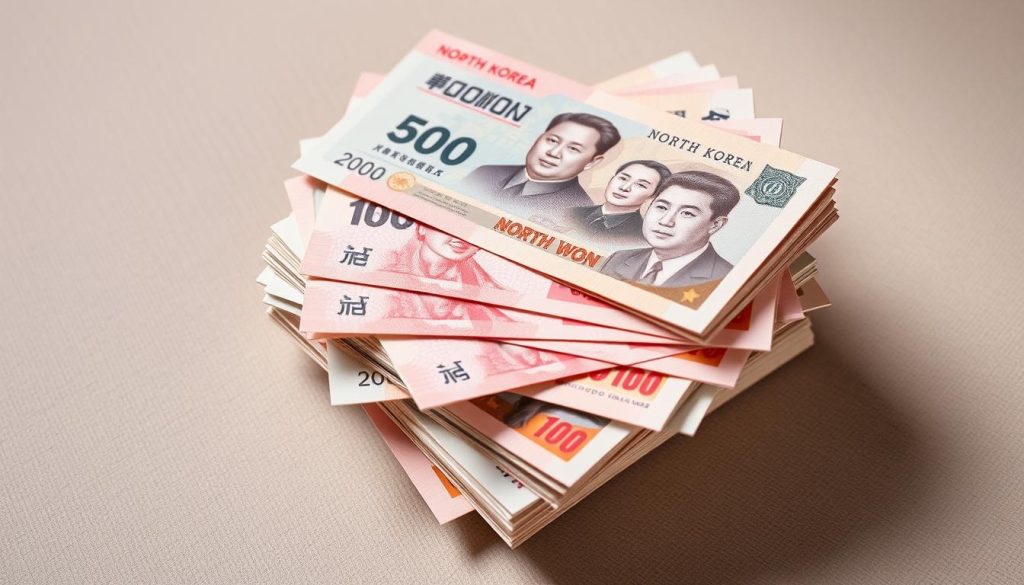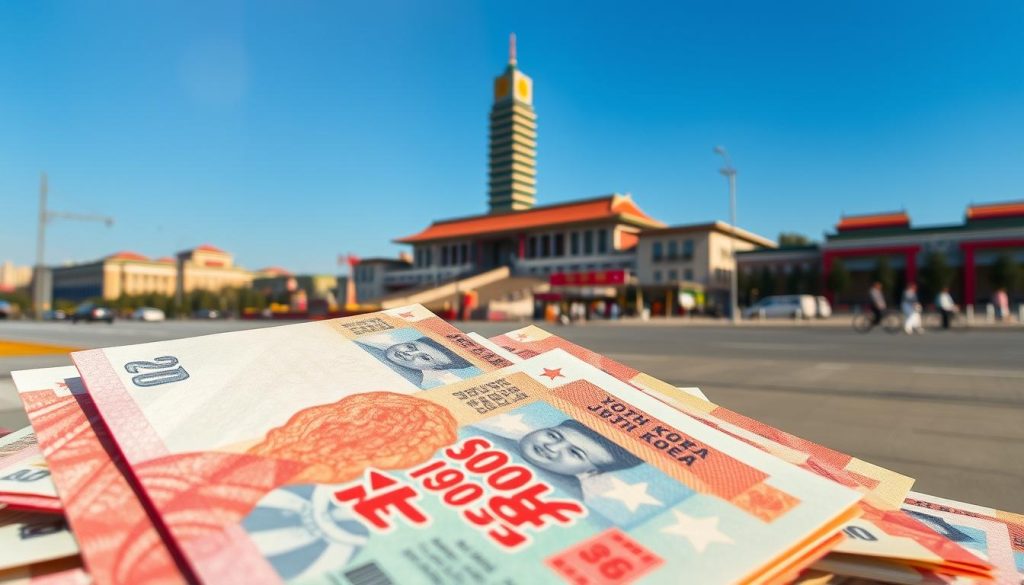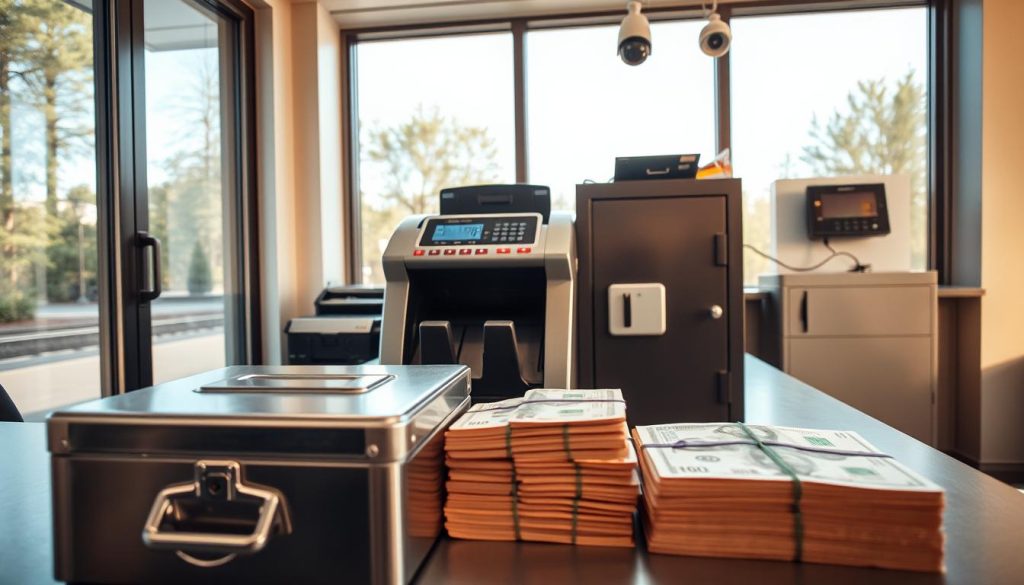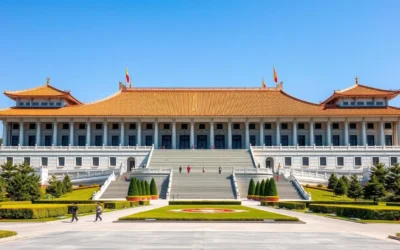Did you know that only a handful of international tourists have visited North Korea in recent years? This makes it one of the most exclusive travel destinations in the world. If you’re planning a trip, understanding how to handle money is crucial for a smooth experience.
In this guide, you’ll learn about the currency system in North Korea, including which foreign currencies are accepted and how to manage your cash. The local currency, the North Korean Won, is rarely used by tourists, so you’ll need to rely on USD, EUR, or RMB.
Cash is king here, as ATMs and banking services are almost nonexistent for visitors. This guide will prepare you for a safe and informed journey, ensuring you’re ready to navigate the unique payment environment of this fascinating country.
Understanding Currency in North Korea
Navigating the payment system here is unlike anywhere else in the world. As a visitor, you’ll need to understand the differences between local and foreign currency. This knowledge will help you manage your money effectively and avoid unnecessary hassles.
Local vs. Foreign Currency Use
The local currency, the KPW, is rarely used by tourists. Instead, USD, EUR, and RMB are the preferred options. These foreign currencies are widely accepted in places like food markets and souvenir shops. This makes it easier for you to make purchases without worrying about exchange rates.
Using foreign cash also saves you time. You won’t need to exchange money frequently, which can be a challenge in this country. Plus, it ensures you’re prepared for any unexpected expenses during your tour.
Economic Importance for Tourists
Foreign currency plays a significant role in the local economy. When you use USD, EUR, or RMB, you’re contributing to the country’s financial system. This helps support local businesses and services that cater to visitors.
Here are a few key points to remember:
- Major currencies are favored over the KPW for most transactions.
- Plan your currency exchanges in advance to avoid last-minute issues.
- Understanding the payment system can make your trip smoother and more enjoyable.
By being informed about currency use, you’ll have a better experience and contribute positively to the local economy.
Overview of North Korean Currency
Understanding the local monetary system is essential for any trip to this unique destination. The currency here is deeply tied to the country’s history and economic policies. As a tourist, you’ll need to familiarize yourself with the banknotes, coins, and their practical uses.

Banknotes and Denominations
The local banknotes come in various denominations, ranging from ₩100 to ₩5000. These notes are widely used for everyday transactions. Here’s a quick breakdown of the most common ones:
| Denomination | Size (mm) |
|---|---|
| ₩100 | 156 × 75 |
| ₩500 | 156 × 75 |
| ₩1000 | 145 × 65 |
| ₩5000 | 145 × 65 |
When visiting, ensure your notes are in good condition. Damaged or torn bills may not be accepted, especially in smaller shops or at the border.
Coin Usage and Limitations
Coins, such as the Chon, are rarely used in daily transactions. Inflation and economic changes have made them less practical. While they exist in denominations like 5, 10, and 50 Chon, you’re unlikely to encounter them during your stay.
Historical context adds depth to the currency’s evolution. For example, the 2009 revaluation introduced new notes, phasing out older ones. This change reflects the country’s economic strategies over time.
By understanding these details, you’ll navigate the local payment system with ease. Whether you’re shopping at markets or crossing the border, this knowledge ensures a smoother experience.
Foreign Currency and Its Role in North Korea
Foreign currency plays a pivotal role in daily transactions for visitors. Understanding which currencies are accepted and how to manage them can make your trip smoother and more enjoyable.
Accepted Currencies: USD, EUR, and RMB
When you visit north, you’ll find that USD, EUR, and RMB are widely accepted. These currencies are preferred over the North Korean Won for most transactions. For example, at the Kwangbok Department store, you can easily exchange foreign cash into local currency if needed.
Using these currencies simplifies payments and ensures you’re prepared for any situation. Carrying low denomination bills, especially in USD or RMB, can make transactions easier and faster.
Advantages of Using Foreign Cash
There are several benefits to relying on foreign currency during your stay. First, it saves you the hassle of frequent exchanges. Second, it’s widely accepted in markets, shops, and even at the store.
Here are some key advantages:
- Foreign cash is more efficient than trying to use the local currency.
- Pristine notes, especially in USD and EUR, are less likely to be rejected.
- Understanding these advantages helps you better prepare for your trip.
By using foreign currency, you’ll navigate the payment system with ease and enjoy a more seamless experience.
North Korea: Ultimate Travelers Guide to Currencies & Payments
When traveling to this unique destination, cash is your most reliable companion. Unlike many other places, ATMs and banking services are virtually nonexistent for visitors. This makes planning your finances in advance absolutely critical.

Carrying ample cash ensures you’re prepared for any situation. Whether you’re shopping at local markets or paying for transportation, having the right denominations can make transactions smoother. For example, smaller bills are ideal for everyday purchases, while larger ones are better for bulk spending.
Here’s why cash is indispensable:
- No ATMs or card services mean you’ll rely entirely on physical currency.
- Specific denominations are more practical for different types of transactions.
- High-quality, crisp notes are less likely to be rejected, especially at official counters.
Another important aspect is handling change. In some cases, you might receive a mix of currencies or even small tokens like stamps or gum. Being aware of this can help you avoid confusion during transactions.
To make your trip as smooth as possible, consider the following tips:
| Denomination | Best Use |
|---|---|
| Small Bills | Everyday purchases, tips, and small transactions |
| Large Bills | Bulk spending, accommodations, and tours |
By understanding the importance of cash and preparing accordingly, you’ll navigate the financial landscape with ease. This ensures a stress-free and enjoyable journey.
Currency Exchange and Rates in North Korea
Exchanging money in this country requires careful planning and awareness of the local system. Official rates and black market trends differ significantly, so understanding these nuances is essential for a smooth experience.
Official Rates vs. Black Market Trends
Official banks offer an exchange rate of approximately 100 KPW per USD. However, the black market often shows rates as high as 13,000-14,000 KPW per USD. This stark difference highlights the importance of choosing your exchange method wisely.
Using unofficial channels can be risky. While the rates may seem appealing, there’s no guarantee of safety or legality. Always prioritize official methods to avoid potential issues during your travel.
Where to Exchange Money
State-owned banks and select hotels are the most reliable places to exchange currency. These locations adhere to official rates and provide a secure environment for transactions. Ensure your visa and travel documents are ready, as they may be required for the process.
Here are some practical tips for a smooth exchange:
- Check current rates before proceeding to avoid surprises.
- Carry pristine notes, as damaged bills may be rejected.
- Plan your money exchanges in advance to save time.
By following these guidelines, you’ll navigate the currency exchange process with confidence and ease.
Navigating Payment Options Without ATMs
Handling money in this destination requires a different approach than most places. ATMs and digital payment systems are virtually nonexistent, making cash your primary resource. This cash-only system can be challenging, but with the right preparation, you’ll navigate it smoothly.
Limitations of Credit and Debit Cards
Credit and debit cards are rarely accepted outside major hotels. Even in these locations, transactions may be limited. This means you’ll need to rely on cash for most purchases, from meals to souvenirs.
Here’s what to keep in mind:
- Cards are only useful in a few high-end establishments.
- Always carry enough cash to cover daily expenses.
- Plan ahead to avoid last-minute financial stress.
Managing Cash-Only Transactions
Managing cash-only transactions requires careful planning. Start by estimating your daily budget, including meals, transportation, and incidentals. Carry small denominations for everyday purchases like a drink or snack.
Here are some practical tips:
- Divide your cash into daily amounts to stay organized.
- Keep extra funds for unexpected expenses.
- Ensure your bills are in good condition to avoid rejection.
By following these strategies, you’ll handle cash transactions with ease and enjoy a stress-free tour.
Special Circumstances: Department Stores and Local Payments
Shopping in Pyongyang’s exclusive department stores offers a unique glimpse into daily life. These venues are not just places to buy goods but also hubs where culture and commerce intersect. Understanding how payments work here can make your visit smoother and more enjoyable.
The Kwangbok Department Store Experience
The Kwangbok Department Store is one of the most iconic shopping destinations in Pyongyang. Here, you can exchange foreign currency like USD, EUR, or RMB into local Won. This process is straightforward, but it’s essential to carry pristine bills, as damaged notes may be rejected.
Once inside, you’ll notice differences in language and signage. Most labels are in Korean, so having a guide or translator can be helpful. Transactions are typically cash-only, and you’ll need to reconvert any unused local currency before leaving the country.
Local Payments and Entry Procedures
Local payments in department stores are efficient but require attention to detail. Here’s a quick guide to ensure a smooth experience:
| Step | Details |
|---|---|
| Currency Exchange | Exchange foreign cash at designated counters. |
| Transaction Limits | Carry small denominations for everyday purchases. |
| Reconversion | Convert unused local currency back before departure. |
Special procedures, such as entry declarations and document checks, may apply. Always carry your passport and any required paperwork. This ensures compliance with local regulations and avoids delays.
By understanding these nuances, you’ll navigate department store payments with ease. Whether you’re buying souvenirs or exploring local goods, this knowledge enhances your overall experience.
Security Measures for Handling Money
Ensuring the safety of your money is a top priority when visiting this destination. With strict regulations and frequent security checks, managing your cash securely is essential for a smooth experience.

When carrying large sums, divide your cash into smaller amounts. Keep some with you and store the rest in a secure location, like a hotel safe. This minimizes the risk of losing everything at once.
Remain vigilant in crowded areas, especially at border crossings. Pickpocketing can occur, so keep your money close and avoid displaying large amounts in public. Use a money belt or hidden pouch for added security.
Hotels and designated safe places can temporarily secure your funds. Always ask about safe storage options when checking in. This ensures your money is protected while you explore the destination.
Here are some practical tips for organizing your cash:
| Tip | Benefit |
|---|---|
| Divide cash daily | Prevents carrying excess money |
| Use small bills | Simplifies transactions |
| Keep emergency funds | Prepares for unexpected expenses |
By following these measures, you’ll safeguard your money and enjoy a worry-free journey. Careful planning ensures you’re prepared for any situation, making your trip to this unique destination more enjoyable.
Preparing Your Cash for Travel to North Korea
Proper cash preparation is essential for navigating unique payment systems abroad. When you visit, having the right bills and keeping them in pristine condition can make transactions smoother and hassle-free. Here’s how to organize your funds effectively.
Strategies for Low Denomination Bills
Carrying small bills is crucial for everyday expenses. Whether you’re buying water, snacks, or souvenirs, low denominations simplify transactions. Here’s how to prepare:
- Divide your cash into daily amounts to stay organized.
- Use smaller bills for tips and small purchases.
- Keep larger bills for accommodations or tours.
For example, travelers often find that having $1, $5, and $10 bills makes it easier to pay for meals or transportation. This strategy ensures you’re always prepared for incidental expenses.
Maintaining Pristine Currency
Pristine, undamaged notes are more likely to be accepted, especially in USD or EUR. Here’s why it matters:
- Damaged bills may be rejected at official counters or shops.
- Crisp notes reflect professionalism and reduce transaction delays.
- Inspect your cash before traveling to ensure it’s in good condition.
To store your money securely, use a money belt or hidden pouch. This protects your cash during transit and keeps it organized for easy access.
“Proper cash preparation is the key to avoiding transaction issues abroad.”
Here’s a quick guide to organizing your funds:
| Bill Type | Best Use |
|---|---|
| Small Bills | Everyday purchases, tips, and snacks |
| Large Bills | Accommodations, tours, and bulk spending |
By following these tips, you’ll ensure a smooth and enjoyable visit. Proper cash preparation is the foundation of a stress-free journey.
Understanding Currency Import and Export Restrictions
Understanding currency restrictions is crucial for a smooth travel experience. When you tour north, you’ll encounter strict rules on carrying money in and out of the country. These regulations are designed to control the flow of currency and ensure compliance with local laws.

Rules on Taking Currency Abroad
The local currency is a closed system, meaning it’s illegal to take it out of the country. If you’re carrying foreign cash, you must declare amounts exceeding a specific limit upon entry or exit. For example, failing to declare USD or EUR could result in fines or confiscation.
Here’s what you need to know:
- Declare all foreign currency above the allowed limit at customs.
- Keep receipts for any exchanges made during your stay.
- Plan ahead to avoid issues at the border.
Key Regulations to Remember
Several rules govern currency import and export. For instance, you’re prohibited from taking local currency out of the country. Additionally, foreign cash must be declared upon entry and exit to avoid penalties.
Here’s a quick guide to the most important regulations:
| Rule | Details |
|---|---|
| Local Currency | Cannot be taken out of the country. |
| Foreign Currency | Must declare amounts above the limit. |
| Documentation | Keep receipts for all exchanges. |
By following these rules, you’ll ensure a hassle-free experience at the border. Proper preparation is key to avoiding fines or delays during your tour north.
Economic Insights from North Korea’s Currency Practices
Exploring the economic and cultural aspects of currency in this region offers a unique perspective on its financial ecosystem. The way money is handled here reflects deep-rooted traditions and historical shifts that shape daily life. Understanding these practices can provide valuable insights for travelers.
Historical Context of the Won
The Won has a rich history, evolving from the Korean Yen in the mid-20th century. Over the years, it has undergone several revaluations, including a significant one in 2009. These changes were not just economic decisions but also reflected the country’s broader financial strategies.
For example, the 2009 revaluation introduced new banknotes, phasing out older designs. This move aimed to stabilize the economy and curb inflation. The way these changes were implemented shows the government’s focus on maintaining control over its financial system.
Cultural Impact on Daily Life
Currency design often mirrors cultural values. The Won’s banknotes feature images of historical figures and landmarks, symbolizing respect for tradition. This connection between money and culture is evident in the way people handle cash in their daily transactions.
In local markets, for instance, the use of pristine notes is preferred. Damaged bills are often rejected, highlighting the importance of maintaining the quality of currency. This practice underscores the cultural significance placed on respect and order.
Here’s a quick overview of key historical revaluations:
| Year | Change | Impact |
|---|---|---|
| 1959 | Introduction of the Won | Replaced the Korean Yen |
| 2009 | Revaluation | New banknotes introduced |
By understanding these economic insights, you’ll gain a deeper appreciation for the country’s financial ecosystem. Whether you’re exchanging USD or observing local transactions, these practices offer a window into the culture and history of this unique region.
Budgeting for Your Stay in North Korea
Budgeting effectively ensures you’re prepared for both planned and unexpected costs during your stay. As a foreigner, understanding your daily expenses is crucial to avoid overspending and ensure a smooth trip. Let’s break down how to create a realistic budget and manage your money wisely.
Estimating Daily Expenses and Incidentals
Start by calculating your daily budget based on expected costs. For example, meals can range from $5 to $20, while transportation might cost $5 to $15 per day. Don’t forget to include incidentals like snacks, drinks, and souvenirs, which can add up quickly.
Here’s a quick breakdown of typical daily expenses:
- Meals: $10-$30 per day, depending on where you eat.
- Transportation: $5-$15 for buses, taxis, or subway rides.
- Souvenirs: $10-$50, depending on your preferences.
Carrying extra cash is essential for unexpected expenses. Whether it’s an unplanned purchase or an emergency, having a safety net ensures you’re always prepared.
Managing Payments and Exchanges
As a foreigner, you’ll rely on cash for most transactions. USD, EUR, and RMB are widely accepted, making payment easier. However, it’s important to exchange your money at official locations to avoid unfavorable rates.
Here’s a comparison of costs in official vs. free markets:
| Item | Official Price | Free Market Price |
|---|---|---|
| Meal | $10 | $7 |
| Souvenir | $20 | $15 |
| Transportation | $10 | $8 |
By planning your budget and understanding the payment system, you’ll feel confident managing your finances during your trip. Whether you’re exploring local markets or visiting landmarks, proper budgeting ensures a stress-free experience.
Preparing for Border and Entry Payment Procedures
Crossing the border into this unique destination requires careful preparation and attention to detail. Strict regulations govern the entry process, making it essential to understand the requirements beforehand. Proper planning ensures a smooth experience and avoids unnecessary delays.
Declaration and Document Requirements
Upon arrival, you’ll need to declare all foreign currency above a specific limit. This includes USD, EUR, or RMB. Ensure your cash is in pristine condition, as damaged bills may be rejected. Keep receipts for any exchanges made during your stay, as they may be required for verification.
Documents such as your passport, visa, and entry forms must be ready for inspection. Having backup copies, either in video format or printed, can expedite the process. Clear communication with officials is key to avoiding misunderstandings.
Tips for a Smooth Entry Process
Here are some practical tips to make your entry hassle-free:
- Organize your cash: Divide it into daily amounts and keep it in a secure location.
- Prepare documentation: Ensure all forms are filled out accurately and legibly.
- Stay informed: Research the latest regulations to avoid surprises at the border.
By following these steps, you’ll navigate the entry process with confidence. Proper preparation ensures a smooth start to your journey, allowing you to focus on the experience ahead.
Conclusion
Proper preparation is the key to a smooth and enjoyable experience. By focusing on cash management, you’ll ensure a hassle-free arrival and stay. Remember, foreign currency like USD, EUR, or RMB is widely accepted, making it easier for your purchase needs.
Digital payments are limited, so cash remains your primary resource. Always carry small denominations for everyday expenses and larger bills for bigger transactions. This approach helps you stay organized and prepared for any situation.
Follow the guidelines for currency exchange and border declarations to avoid complications. Proper planning ensures you’re ready to handle the unique payment system. With these tips, your journey will be both successful and enjoyable.
By adhering to these practices, you’ll navigate the financial landscape with confidence. Thorough preparation and attention to detail will work in your favor, making your trip memorable and stress-free.
The above is subject to change.
Check back often to TRAVEL.COM for the latest travel tips and deals.





0 Comments